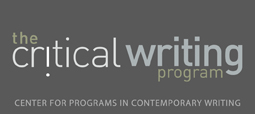Communications
Overview
Communication studies is "an academic field that deals with the processes of communication, commonly defined as the sharing of symbols over distances in space and time" (Wikipedia). Areas of study in the discipline of communications are the following (with parenthetical explanation):
- Interpersonal and organizational communication (one-on-one conversations and large group dynamics)
- Rhetorical studies (persuasion and argumentation in political settings and within social movements)
- Performance studies (relationships among literature, theater, and everyday life)
- Media studies (cultural influences and practical techniques of various media technologies, such as television and film)
Writing in the Discipline
Goal
Various communications researchers have various goals. For instance, some communications researchers' work is very theoretical and based in the humanities, while others’ research is data driven and problem/solution oriented. Communications researchers manage, analyze, and work to improve communication in every arena of personal, public, and professional interaction.Reasoning
Reasoning is generally explanatory, and involves the testing and exploration of ideas. Communications researchers might discuss contradicting data in their writing, but these should not overshadow the main argument or hypothesis being tested. Reasoning is inductive; it progresses from data to theory and discussion of the potential significance of results.
Evidence
Quantitative data is preferred over qualitative data in the field of communications, though both are acceptable. The majority of evidence is data based and involves empirical investigation of social phenomena and analysis of aggregated statistical data. Qualitative evidence, however, such as case studies, focus groups and ethnographic research are also viable forms of evidence in the field of communications. Secondary evidence includes observations and theories of other scholars in the field. Traditionally, the field of communications was based in theories, but in the 30s and 40s it became more quantitative and research oriented.
Authorship
Depending on the sub-discipline and personal preference, communications researchers can either be collaborative or individualistic. While a few communications researchers work independently, the majority work in teams to specialize and streamline parts of the research process. Professor Wright stated that while he has published some independent work, the majority of his research has been collaborative. He emphasized the importance of strong relationships with coworkers, both for publishing purposes as well as for editing purposes.Writing Tips
Common Errors
Common errors in communications literature at an undergraduate level include excessive wordiness and technical jargon. Students have a tendency to lose sight of their strongest points in an attempt to satisfy a word count. Professor Wright urges students write about something relevant to the seminar and the modern world, as well as about something that interests them. He asks each of his students before they approach a writing assignment, “How do you know when it is finished?” This approach encourages the student to know what their problem or question is and find a solution, which is a goal of the communications field in general.Style
Appropriate style, or voice, for writing in the discipline of communications includes the following features:
- Use of "I": placing oneself in the text. This is especially prevalent in qualitative research.
- Clear diction: no use of jargon. Words should be explained rather than assuming that the audience knows their meaning.
- Accessible to audience: which is typically advanced undergrads.
- Formal: but, with occassional humor.
Genre
Student Assignments
Types of student assignments include:
- Article Analysis (summarize article)
- Review Essay (analyze article)
- Comparative of Articles (synthesis of different sources)
- Empirical (based on observation)
Additional Resources
Robert Mertin is an example of an exemplary writer in the field of Communications.© 2013 The University of Pennsylvania
Meet the Professors
.jpg)
Professor Katherine Sender
Professor Katherine Sender is an associate professor at the Annenberg School for Communication, University of Pennsylvania. She is also associate dean of graduate studies. Her areas of expertise include consumer and popular culture; gay, lesbian, bisexual, and transgender media and marketing; reality television, especially makeover shows; audience research; cultural production; media industries; and documentary film and video, including production. More...

Professor Charles Wright
Charles R. Wright is Professor Emeritus of Communication and Society. He explored his interest in the intersection of sociology and mass communication in Mass Communication: A Sociological Perspective, which is currently used in the course Communication 628. More...
